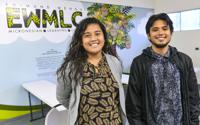Immigrants from all over Micronesia who travel hundreds of miles to Guam for medical care continue to face challenges in accessing care and insurance.
Medicaid will be available to citizens of the Federated States of Micronesia, the Marshall Islands, and Palau in January 2021, but problems with the application and registration process, as well as other barriers, have hampered care.
Diabetes, cancer, heart disease, stroke, and obesity are chronic health problems for many Guam residents, said Alex Silverio, director of Guam Minority Health Services at the Department of Public Health and Social Services.
“Particularly hard hit are our brothers and sisters in the Micronesian region,” he said.
Silberio said patients, particularly those from other islands in the region, come to public health in manageable conditions that have developed to the point of being life-threatening and requiring emergency treatment.
Barriers such as language, low income for transportation and unemployment compound the problem.
transportation
When people cannot afford or have limited access to a car, the only other option is public transport, which can be difficult to use when it becomes available. I have.
To solve this problem, the Mane’lu Micronesian Resource Center One Stop Shop has a vehicle called the Mobile Access to Information van that runs every Wednesday.
Shuichi Mori, the center’s project coordinator, said it provides a way for clients to get to clinics and offices.
A language barrier for migrants with little or no English can impede their ability to fill out medical forms and communicate with healthcare professionals.
While Silverio appreciates organizations like Mane’lu for providing translations, public health officials need doctors, nurses, and employees who know the patient’s language and culture. He said he needed to recruit more staff.
employment
Unemployment is another issue, as insurance is usually provided through work.
Your only other options are Medicaid or expensive private insurance.
Even if someone has a job, income can limit access to care.
“Many of our clients have an income. But that’s over the Medicaid eligibility limit, but they can’t afford private insurance if it’s not provided by their job,” said a caseworker at the Micronesia Resource Center. said Jamie Hinrich.
Medicaid
Sam Ilesgam, a community advocate for residents from his native Yap, Federated States of Micronesia, said his Medicaid eligibility helped.
However, I have a problem with the process.
“Even if you apply now, there is a six-month residency requirement,” says Ilesugam. This can be deadly for immigrants in urgent need of medical care.
Nedine Songeni, founder of the organization Neechuumeres: Chuukese Women of Guam, said while her organization and others are moving toward helping people apply, the bureaucracy and paperwork to register is huge. said to be a barrier.
That’s why some people give up on treatment and wait until they need to go to the emergency room, she said.
struggle
Kinta Lapung, 55, from Dededo, Chuuk, is struggling to get health insurance.
“I really wanted insurance, applied to Public Health, etc., was renewing my application, and waited a long time. I really need asthma medicine,” said Lapun.
When she was laid off in 2021, she lost her job and health insurance.
The custody job she does does not provide health insurance and she cannot afford to buy herself.
She said the Medicaid process is frustrating because the instructions for applications requiring multiple trips are conflicting and confusing.
“Clients apply for Medicaid, and by the time Public Health has cleared part of the application, some documents may be past due,” Mori said.
For example, payslips must be submitted within two weeks, and once that portion of the application has been processed, he said a new payslip will be required after three to four weeks.
Micronesia Resource Center employees provide insight into how nonprofits are helping with health-related issues, especially for members of the Micronesian community.

